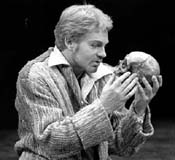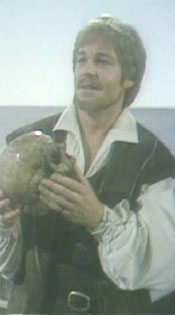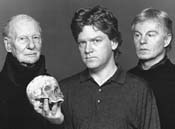 Derek
Jacobi is among the most accomplished Shakespearean actors of the twentieth
century, having first achieved recognition as a founding member of Laurence
Olivier's National Theatre Company, notably as Laertes opposite Peter O'Toole's
Hamlet in the company's premiere production in 1963, and later as Michael Cassio
opposite Olivier's Othello. He played Hamlet at the age of 18 for the England
Youth Theatre at the Edinburgh Festival, but didn't return to the role until
he was 39 years old in the Prospect Theatre Company production of 1978. Jacobi
created a sensation in the part, playing Hamlet over 300 times and taking it
to such far corners as China and (following the tradition started by Tyrone
Guthrie and Laurence Olivier in 1937) Kronberg Castle in Elsinore, where the
play is set. Ned Chaillet of the London Times wrote "Mr. Jacobi builds
a vigilant Hamlet. He is not restrained by conscience or doubt from killing
Claudius and claiming his throne, but the only weapons he is free to use are
irony and an aggressive mockery. This Hamlet is passionate, methodical and quick-witted,
and might, most unusually among Hamlets, have proved most loyal, had he become
king."
Derek
Jacobi is among the most accomplished Shakespearean actors of the twentieth
century, having first achieved recognition as a founding member of Laurence
Olivier's National Theatre Company, notably as Laertes opposite Peter O'Toole's
Hamlet in the company's premiere production in 1963, and later as Michael Cassio
opposite Olivier's Othello. He played Hamlet at the age of 18 for the England
Youth Theatre at the Edinburgh Festival, but didn't return to the role until
he was 39 years old in the Prospect Theatre Company production of 1978. Jacobi
created a sensation in the part, playing Hamlet over 300 times and taking it
to such far corners as China and (following the tradition started by Tyrone
Guthrie and Laurence Olivier in 1937) Kronberg Castle in Elsinore, where the
play is set. Ned Chaillet of the London Times wrote "Mr. Jacobi builds
a vigilant Hamlet. He is not restrained by conscience or doubt from killing
Claudius and claiming his throne, but the only weapons he is free to use are
irony and an aggressive mockery. This Hamlet is passionate, methodical and quick-witted,
and might, most unusually among Hamlets, have proved most loyal, had he become
king."
 Jacobi's
Hamlet might have faded into the pages of theatrical history books had he not
achieved international stardom in the title role of the BBC miniseries I,
Claudius. The acclaim of Jacobi's stage performance combined with his newfound
television celebrity made him the natural choice to play Hamlet in the BBC's
ambitious Complete Dramatic Works of William Shakespeare television
series. Aided by memorable performances from Claire Bloom as Gertrude and Eric
Porter as Polonius, and a remarkable one by his I, Claudius costar
Patrick Stewart as Claudius, Jacobi's passionate Dane is the greatest performance
of the role ever captured on film, light years beyond Laurence Olivier's wooden
and overrated depiction in his 1948 film. Cecil Smith wrote in The Los Angeles
Times wrote "Inside the prince, as the soliloquies reveal, Jacobi's Hamlet
is a cauldron of intellectual conflict - his soldier's militancy in deadly battle
with his student philosophy. Shaw once said that Hamlet, born to military barbarism
and heir to a blood feud, was incapable of conventional revenge 'because he
had evolved into a Christian without knowing it' - and Jacobi's Hamlet, more
than any I have seen, seems to bear this out. What he is not is the traditional
melancholy Dane. Jacobi, who looms as one of the English-speaking theater's
most interesting actors, gives us a Hamlet of great charm and wit, capable of
wonderfully funny badinage with the grave digger - changing instantly into deep
compassion over the skull of poor Yorick. It's a performance that is varied
and inventive and highly intelligent."
Jacobi's
Hamlet might have faded into the pages of theatrical history books had he not
achieved international stardom in the title role of the BBC miniseries I,
Claudius. The acclaim of Jacobi's stage performance combined with his newfound
television celebrity made him the natural choice to play Hamlet in the BBC's
ambitious Complete Dramatic Works of William Shakespeare television
series. Aided by memorable performances from Claire Bloom as Gertrude and Eric
Porter as Polonius, and a remarkable one by his I, Claudius costar
Patrick Stewart as Claudius, Jacobi's passionate Dane is the greatest performance
of the role ever captured on film, light years beyond Laurence Olivier's wooden
and overrated depiction in his 1948 film. Cecil Smith wrote in The Los Angeles
Times wrote "Inside the prince, as the soliloquies reveal, Jacobi's Hamlet
is a cauldron of intellectual conflict - his soldier's militancy in deadly battle
with his student philosophy. Shaw once said that Hamlet, born to military barbarism
and heir to a blood feud, was incapable of conventional revenge 'because he
had evolved into a Christian without knowing it' - and Jacobi's Hamlet, more
than any I have seen, seems to bear this out. What he is not is the traditional
melancholy Dane. Jacobi, who looms as one of the English-speaking theater's
most interesting actors, gives us a Hamlet of great charm and wit, capable of
wonderfully funny badinage with the grave digger - changing instantly into deep
compassion over the skull of poor Yorick. It's a performance that is varied
and inventive and highly intelligent."
 Jacobi
returned to the play in 1988, directing his protégé Kenneth Branagh
in his first attempt at the title role at the Birmingham Repertory Theatre in
1988. Branagh returned the favor by casting his mentor as the Chorus in his
masterful film of Henry V in 1989. They continued the partnership in
1996, with Jacobi contributing an ineffective performance as Claudius in Branagh's
overlong, pretentious film of Hamlet that featured monumentally awful
performances by movie stars like Jack Lemmon, Billy Crystal and Gérard
Depardieu (as well as a jarring, nonspeaking cameo by the century's greatest
Hamlet, John Gielgud). Jacobi would continue to give remarkable performances
in such films as Gladiator and Gosford Park, and on television
in Inside the Third Reich and Emmy Award-winning turns in the TV movie
The Tenth Man and a delightfully memorable guest appearance on the
sitcom Frasier as a terrible Shakespearean actor. The part must have
been a stretch for Jacobi, who continues to be best known for his work on the
Shakespearean stage; winning a Laurence Olivier Award in 2009 for his performance
as Malvolio in Twelfth Night.
Jacobi
returned to the play in 1988, directing his protégé Kenneth Branagh
in his first attempt at the title role at the Birmingham Repertory Theatre in
1988. Branagh returned the favor by casting his mentor as the Chorus in his
masterful film of Henry V in 1989. They continued the partnership in
1996, with Jacobi contributing an ineffective performance as Claudius in Branagh's
overlong, pretentious film of Hamlet that featured monumentally awful
performances by movie stars like Jack Lemmon, Billy Crystal and Gérard
Depardieu (as well as a jarring, nonspeaking cameo by the century's greatest
Hamlet, John Gielgud). Jacobi would continue to give remarkable performances
in such films as Gladiator and Gosford Park, and on television
in Inside the Third Reich and Emmy Award-winning turns in the TV movie
The Tenth Man and a delightfully memorable guest appearance on the
sitcom Frasier as a terrible Shakespearean actor. The part must have
been a stretch for Jacobi, who continues to be best known for his work on the
Shakespearean stage; winning a Laurence Olivier Award in 2009 for his performance
as Malvolio in Twelfth Night.